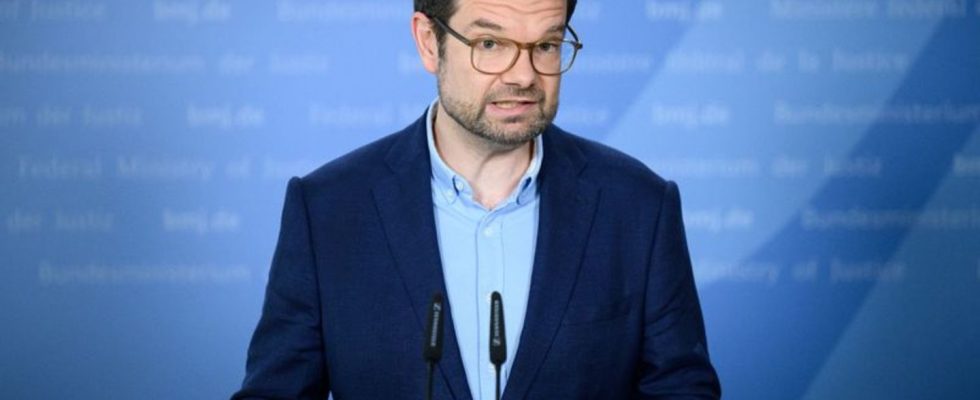migration
Buschmann: Payment cards for asylum seekers are less bureaucratic
“The payment card is an unbureaucratic way to do this, where no one has to hand out goods or issue tokens,” says Marco Buschmann (FDP). photo
© Bernd von Jutrczenka/dpa
With the high number of refugees, the discussion about more control over migration to Germany is also becoming more heated. And once again a dispute is emerging in the traffic light coalition.
In the debate about benefits in kind instead of cash for Federal Justice Minister Marco Buschmann has spoken out in favor of payment cards for asylum seekers. “If asylum seekers are housed in shared accommodation, benefits in kind are already the legal norm,” said the FDP politician to the German Press Agency. It should be considered whether this principle should not be made the rule in all cases. “The payment card is an unbureaucratic way to do this, where no one has to hand out goods or issue tokens.”
FDP leader Christian Lindner once again called for benefits in kind instead of cash benefits in order to reduce incentives to come to Germany. He also called for more control over migration. “We will remain a cosmopolitan country if we control access to our country,” said the Federal Finance Minister on Friday evening at the end of the Bavarian FDP’s election campaign in Munich. “In Germany we make it too difficult for those who we urgently need as smart minds and hard-working hands in our job market to come.” At the same time, it makes it easy for those “who have immigrated illegally to our welfare state in order to benefit from it.”
Brandenburg’s Interior Minister Michael Stübgen has called for immediate action from Chancellor Olaf Scholz in view of the dwindling reception capacity for asylum seekers in the states. “The Chancellor must make the migration crisis his sole top priority,” said the CDU politician to “Welt am Sonntag”. On this issue, Scholz must “finally free himself from being held hostage by the Greens and parts of his own party.”
Union faction: Baerbock partly responsible for migration
The CDU/CSU parliamentary group in the Bundestag holds Foreign Minister Annalena Baerbock (Greens) partly responsible for the high number of arriving migrants. Baerbock has “so far not contributed anything to overcoming the migration crisis, but on the contrary has only prevented, delayed and thwarted it,” said deputy parliamentary group leader Andrea Lindholz (CSU) to the dpa.
The minister rejects the further expansion of the list of safe countries of origin. In such countries it is assumed that there is generally neither persecution nor inhumane or degrading treatment – which should enable faster asylum procedures. But Federal Interior Minister Nancy Faeser (SPD) is also “rightly heavily criticized” in the migration crisis because she doesn’t come close to getting the situation under control, said Lindholz.
The Green politician and Bundestag Vice President Katrin Göring-Eckardt called for more order in migration policy. Since the AfD benefits from disorderly migration, it is “vehemently in favor of us creating order,” Göring-Eckardt told the “Frankfurter Allgemeine Sonntagszeitung”. “We can do this by never forgetting that it is people who come to us, not numbers. We can do this through registration, quota refugees, migration agreements and rapid repatriation,” she said.
Göring-Eckardt also advocated that Europe take in a contingent of refugees every year and distribute them across Europe. However, people without a claim to asylum should be deported more quickly than before. This should be made possible through migration agreements with the countries of origin.
Klingbeil for faster work permits
The deputy FDP parliamentary group leader Christoph Meyer warned the Greens against blocking changes to the law. “Our welfare state is attracting illegal migrants to Germany, this has to stop,” Meyer told the “Bild” newspaper. He called on the Greens to focus more closely on the demands of citizens.
The migration expert Herbert Brücker warned the parties in the “Rheinische Post” against raising too high expectations of possible cuts for asylum seekers. “We know from surveys that people come to us primarily because of legal certainty, the prospect of a fair asylum procedure and respect for human rights,” said the researcher at the Federal Employment Agency’s Institute for Labor Market and Occupational Research (IAB). Depending on the survey, social benefits were only cited as one reason among many by a good 20 to almost 30 percent of refugees. Most quantitative studies also showed no statistically significant connection between benefit levels and asylum migration.
The co-chair of the SPD, Lars Klingbeil, spoke out in favor of faster access to the job market for refugees. “Work is a crucial factor for integration. That’s why I’m in favor of bringing people who have fled to us and can stay here onto the job market more quickly,” said Klingbeil to the “Rheinische Post” (Saturday).

